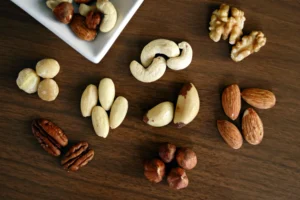Generated by Contentify AI
- Introduction
- What is Sugar
- The Effects of Sugar on Your Body
- Hidden Sources of Sugar
- Sugar Substitutes and Alternatives
- Health Risks Associated with Excess Sugar Intake
- How to Reduce Sugar in Your Diet
- Understanding Sugar Addiction
- Sugar and Weight Gain
- Conclusion

Introduction
When it comes to diet and nutrition, sugars are often vilified and seen as something to be avoided. But what really is sugar and what role does it play in our diets? This blog will provide an in-depth look at the various types of sugar, their dietary implications, and how to choose the right sugar for you.
First, let’s start by understanding what sugar is. Sugar is a carbohydrate that occurs naturally in many fruits, vegetables, milk, and honey. It is also added to many processed foods as a sweetener or preservative. There are two main types of sugar: simple and complex. Simple sugars, or monosaccharides, are found in fruits and honey and are composed of a single sugar molecule while complex sugars, or polysaccharides, are made up of multiple sugar molecules and are found in grains, legumes, and vegetables.
The body needs sugar to function and it is a source of energy. However, eating too much sugar can lead to weight gain, insulin resistance, and increased risk of developing type 2 diabetes. The key is to choose the right type of sugar and to limit your intake.
When choosing the right type of sugar, it’s important to consider both the amount of sugar in a food and the type of sugar. Research has shown that simple sugars are quickly absorbed by the body, providing a quick burst of energy, while complex sugars are broken down more slowly, providing a steady release of energy. This means that it’s best to limit your intake of simple sugars and opt for complex sugars instead.
In addition, it’s important to be aware of added sugars in processed foods. Added sugars can come in the form of high-fructose corn syrup, dextrose, and sucrose. These types of sugar are often used as sweeteners and preservatives in processed foods and should be avoided when possible.
Finally, it’s important to be mindful of your overall sugar intake. The American Heart Association recommends limiting added sugars to no more than 6 teaspoons a day for women and 9 teaspoons a day for men. This means avoiding added sugars in processed foods and limiting your intake of naturally occurring sugars in fruits and dairy products.
By understanding the types of sugar, the amount of sugar you should be consuming, and the added sugars in processed foods, you can make sure you’re getting the right amount of sugar
What is Sugar
When it comes to understanding the role of sugar in your diet, it’s important to recognize the differences between added sugars and naturally-occurring sugars. Added sugars are refined sugars that are added to food during processing or preparation, and they are found in items like soft drinks, candy, and baked goods.
On the other hand, natural sugars are naturally found in fruits, dairy, and milk products. While added sugars may offer a sweet flavor to a food, they don’t have many nutritional benefits and can actually lead to weight gain.
It’s important to note that all sugars, both added and natural, can contribute to tooth decay if not consumed in moderation. Therefore, the key is to limit the amount of added sugar you consume each day.
To ensure you’re not consuming too much added sugar, you should familiarize yourself with the different forms of sugar and be aware of how much sugar is in the food you eat. For example, stay away from foods with large amounts of high-fructose corn syrup—a common form of added sugar—and look for low-sugar alternatives whenever possible.
By following these simple tips, you can help reduce your sugar intake and maintain a healthy and balanced diet. Understanding the role of sugar in your diet is an important part of overall health and wellness, so make sure you’re taking steps to make sure you’re consuming the right amount of sugar for your body.
The Effects of Sugar on Your Body
Sugar plays an important role in our diet, but it has its drawbacks. Eating too much sugar can lead to serious health problems, such as obesity, heart disease, and diabetes. It can also cause tooth decay, because the sugar combines with the bacteria in your mouth to produce acid that can damage the enamel on your teeth.
The most important effect of sugar on your body is how it affects your blood sugar levels. When you eat sugar, your body breaks it down into glucose, which is the form of sugar that circulates in your bloodstream. High levels of glucose in your bloodstream can lead to insulin resistance, which means your body is having trouble using the hormone insulin to process the glucose. This can lead to diabetes, as well as other health problems.
Sugar can also cause inflammation in the body, which can lead to a variety of health issues, such as arthritis and heart disease. It can also contribute to weight gain, due to the fact that it is high in calories and can cause your body to crave more sugary foods.
Finally, sugar can cause energy crashes and mood swings. Eating too much sugar can cause you to be lethargic, irritable, and unfocused. It can also make it difficult to concentrate, as your body is always looking for another sugar fix.
In short, sugar can have serious health consequences if you consume too much of it. It is important to limit your sugar intake and opt for healthier alternatives, such as whole grains, fruits, and vegetables. Eating a balanced diet that includes plenty of fruits and vegetables can help you maintain healthy blood sugar levels.
Hidden Sources of Sugar
When it comes to consuming sugar, many of us don’t give much thought to the hidden sources of sugar that end up in our diets. Sure, we know to avoid the obvious sugary treats like candy and soda. However, there are many other sources of sugar that may surprise you.
For starters, many processed foods contain added sugars, which can quickly add up if you’re not paying attention. Many canned and boxed goods, including soups, sauces, and frozen meals, contain added sugar. Even breakfast cereals can contain high amounts of sugar.
Bakery items, such as cakes, donuts, and cookies, are other obvious sources of sugar. But be careful of so-called “healthy” snacks, like protein bars and energy bars, as they can also contain a lot of sugar.
Another hidden source of sugar is found in beverages. Most of us know that sugary sodas should be avoided, but the same applies to sugary juices and specialty coffees. Even seemingly healthy drinks, like smoothies or fruit juices, can contain a lot of added sugar.
Finally, many condiments, such as ketchup, salad dressings, and barbecue sauces, contain added sugar. Reading the labels carefully is essential when trying to identify hidden sugar sources.
Given the prevalence of added sugars in so many different foods, it’s important to understand the role of sugar in your diet. Eating too much sugar can lead to weight gain, increased risk for type 2 diabetes, and other health problems. To reduce your sugar intake, focus on eating whole foods, such as fruits and vegetables, and limiting your intake of processed and sugary foods.
Sugar Substitutes and Alternatives
When looking at changing your diet, one of the biggest factors to consider is the role of sugar. Sugar has become such a ubiquitous part of our lives, that it’s easy to forget how much we consume on a daily basis. That’s why it’s important to understand the role sugar plays in your diet and how to make smart substitutions that will help you maintain a balanced and healthy lifestyle.
One of the most popular alternatives to sugar are sugar substitutes. These are essentially low-calorie, or calorie-free sweeteners that can be used to sweeten food and drinks. They are usually made from plant-based sources and come in a variety of forms. Some of the most popular sugar substitutes include stevia, monk fruit, and erythritol. All of these alternatives contain substantially fewer calories than regular sugar and are often used in place of sugar in cakes, cookies, and other baked goods.
In addition to sugar substitutes, there are also other alternatives to sugar that can be incorporated into your diet. Fruits and vegetables are naturally sweet and provide an abundance of vitamins, minerals and fiber. You can also reduce your sugar intake by replacing sugary snacks and beverages with lower sugar options like yogurt, nuts, and oatmeal. Finally, you can use natural sweeteners like honey or maple syrup, which are slightly lower in calories than regular sugar, but still provide a sweet taste.
By understanding the role of sugar in your diet and taking steps to reduce your sugar intake, you can take control of your health and start living a healthier, more balanced life. With the help of sugar substitutes and alternatives, you can still enjoy the sweet taste of sugar without all the added calories.
Health Risks Associated with Excess Sugar Intake
If you’re like most people, you consume more sugar than you should. While it’s okay to indulge in some sugary treats every now and then, consuming too much sugar can be detrimental to your health. Understanding the health risks associated with excess sugar intake is an important part of managing your diet and overall health.
Excess sugar intake can lead to a number of health risks, including weight gain, high blood pressure, and increased risk of diabetes. Sugary foods generally contain high amounts of calories but offer little nutritional value. As a result, they can add pounds to your waistline without providing your body with the nutrients it needs. Additionally, eating too much sugar can cause your body to become resistant to insulin, leading many to develop type 2 diabetes.
High blood pressure is another health risk associated with excessive sugar intake. When you eat too much sugar, your body releases large amounts of insulin, which can lead to a spike in your blood pressure. Over time, this can damage your cardiovascular system and increase your risk of heart attack and stroke.
Finally, eating too much sugar can damage your teeth. Sugary foods provide food for bacteria in the mouth, which can lead to tooth decay and gum disease.
For all these reasons, it’s important to pay close attention to the amount of sugar in your diet. Eating sugar in moderation can provide you with energy and improve your mood, but it’s important to keep your intake in check. Keeping track of how much sugar you’re consuming and reducing your intake can help you to reduce your health risks and maintain a healthy diet.
How to Reduce Sugar in Your Diet
Sugar plays an important role in our diets, providing the body with energy and other essential nutrients. However, too much sugar can be unhealthy and can lead to health problems such as obesity and diabetes. Therefore, it is important to know how to reduce sugar in your diet in order to maintain optimal health.
One of the most effective ways to reduce sugar in your diet is to limit or eliminate processed and packaged foods. These foods often contain added sugars that can quickly add up and have a negative impact on your health. Instead, focus on eating whole foods such as fruits, vegetables, nuts, legumes, and whole grains. These whole foods contain natural sugars that are not as harmful as added sugars.
Another way to reduce sugar in your diet is to watch your beverage intake. Sweetened beverages such as sodas, juices, and energy drinks can have a large amount of added sugar that can quickly add up. Instead, opt for healthier drinks such as water, unsweetened tea, and low-fat or non-fat milk.
Reducing sugar in your diet can also be achieved by making small changes to your favorite recipes. Substitute white sugar for natural sweeteners such as honey or maple syrup or reduce the amount of sugar used in a recipe. Additionally, replace sugary snacks with healthier options such as fruit, nuts, and whole-grain crackers.
In conclusion, reducing sugar in your diet is an important step towards achieving optimal health and wellness. By limiting or eliminating processed and packaged foods, watching your beverage intake, and making small changes to recipes, you can reduce your sugar intake and achieve better health.
Understanding Sugar Addiction
Sugar addiction is a growing problem in modern society and can have serious health consequences. Many of us struggle with controlling our sugar intake, and in some cases, we become completely dependent on sugar. To understand sugar addiction, it’s important to understand the role sugar plays in our diets.
Sugar, in its most basic form, is a simple carbohydrate. It’s found in many foods, but it’s most commonly associated with sweets like candy and cakes. When we eat sugar, our bodies break it down and use it as energy. However, our bodies can only process a certain amount of sugar at once. When we consume more sugar than our body can process, it is stored as fat.
The problem with sugar is that it can be incredibly addictive. This is because sugar is actually a type of drug. When we eat sugar, our bodies release dopamine, which is a chemical that makes us feel good. This is why we often crave sugar after eating it, as our bodies are seeking out the dopamine rush.
Unfortunately, sugar addiction can lead to many health problems. Consuming too much sugar can lead to weight gain, as well as heart disease, diabetes, and other illnesses. It’s important to be aware of your sugar intake and to make sure you’re not overdoing it.
If you think you may have a sugar addiction, there are steps you can take to reduce your consumption. Start by slowly reducing the amount of sugar you eat. Replace sugary snacks with healthier alternatives, like fruits and vegetables. Eat small meals throughout the day instead of large ones. Find alternative ways to reward yourself, like taking a walk or reading a book. Finally, talk to your doctor if you feel like you have a problem.
Understanding the role of sugar in your diet is key to managing your sugar addiction. By being aware of your sugar consumption and taking steps to reduce it, you can live a healthier life and avoid the potential health risks of too much sugar.
Sugar and Weight Gain
When it comes to the impact of sugar on your weight, it’s important to understand that there’s a lot more to it than just eating “too much” sugar. Sugar is a naturally occurring carbohydrate that is found in many common foods, from fruits and vegetables to grains and dairy products.
The real issue with sugar and weight gain is that too much of it can contribute to an increase in calories that can lead to weight gain. When you consume too much sugar, it is converted into fat in the body, which is then stored away for later use.
So, while it’s important to watch your portion sizes and limit your sugar intake, it’s also important to focus on the quality of the foods you are consuming. Foods that are high in sugar content, such as candy, baked goods, and snacks, provide your body with empty calories that can quickly add up.
On the other hand, a diet that consists of whole, natural foods such as fruits, vegetables, whole grains, and lean proteins can provide your body with the energy it needs without loading it up with unnecessary sugar.
It’s also important to note that not all sugars are created equal. For example, natural sugars found in fruits and vegetables are digested differently than the added sugars found in processed foods.
So, while it’s important to limit the amount of sugar you consume, it’s also important to make sure you’re eating the right kinds of sugars and avoiding the wrong ones. This way, you can avoid weight gain without sacrificing the sweet treats you love.
Conclusion
Sugar can be a helpful part of a balanced diet, but it’s important to remember that it should be used in moderation. Eating too much sugar can lead to health risks such as obesity, diabetes, and heart disease. It’s also important to remember that sugar is often added to processed foods, so it’s important to read labels carefully and avoid foods with added sugar when possible. Finally, it’s important to remember that there are healthier options for satisfying sweet cravings, such as fresh fruit, that can provide essential nutrients as well as a sweet taste.
In conclusion, understanding the role of sugar in your diet is an important part of maintaining a healthy lifestyle. Eating too much sugar can lead to a variety of health risks, but incorporating it in moderation can be an excellent way to satisfy cravings without compromising nutrition. So, have a piece of dark chocolate every now and then, but remember to stay mindful of the amount of sugar in your diet. Your body and your taste buds will thank you!






